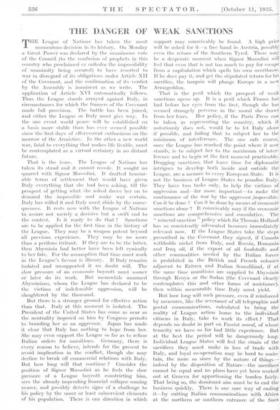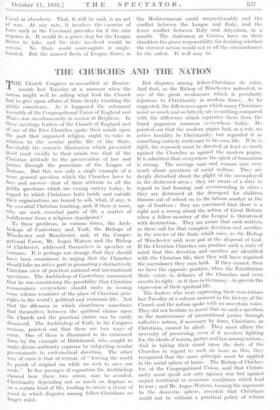THE DANGER OF WEAK SANCTIONS
THE League of Nations has taken the most I- momentous decision in its history. On Monday a Great Power was declared by the unanimous vote of the Council (to the confusion of prophets in this country who proclaimed ex cathedra the impossibility of unanimity being secured) to have resorted to war in disregard of its obligations under Article XII of the Covenant, and the confirmation of its verdict by the Assembly is imminent as we write. The application of Article XVI automatically follows. Thus the League stands arrayed against Italy, in circumstances for which the framers of the Covenant made full provision. The battle has been joined, and either the League or Italy must give way. In the one event world peace will be established on a basis more stable than has ever seemed possible since the first days of effervescent enthusiasm on the morrow of the Armistice. In the other a new world war, fatal to everything that makes life livable, Must be contemplated as a virtual certainty in no distant future.
That is the issue. The League of Nations has taken its stand and it cannot recede. It sought no quarrel with Signor Mussolini. It drafted honour- able terms of settlement that would have given Italy everything that she had been asking, till the prospect of getting what she asked drOve her on to demand the imposs'ible and make war certain. Italy has willed it and Italy Must abide by the cense- quences. It rests now with the League. of Nations to' assure not merely a, decisive but a swift end to the contest. Is it ready to do that, ? Sanctions are to be applied for the first time in the history of the League. They may be a weapon potent beyond all previous experience. They may be no more than a perilouS irritant. If they are to be the latter, then 'Abyssinia had better have been left cynically to her fate. For the assumption that time must work in the League's favour is illusory. If Italy remains isolated and unsupported it no doubt will. The slow pressure of an economic boycott must sooner or later, do its work. But meanwhile unarmed Abyssinians, whom the. League has declared to be the victims of indefensible aggression, will be slaughtered by the thousand.
But there is a stronger ground for effective action than that. Italy at this moment is isolated. The President of the United States has come as near as the neutrality imposed on him by Congress permits to branding her as an aggressor. Japan has made it clear that Italy has nothing to hope from her. She may even support the League so far as to refuse Italian orders for munitions. Germany, there is every reason to believe, intends for the present to avoid implication in the conflict, though she may decline to break off commercial relations with Italy. But how long will that continue ?' Consider the Position of Signor Mussolini as he feels the slow Pressure of a League boycott constricting him, sees the already impending financial collapse coming nearer, and possibly detects sighs of a challenge to his policy by the saner or least subservient elements of his population. There is one direction in which
support may conceivably be found. A high price will be asked for it---7a free hand in Austria, possibly even the return of the Southern Tyrol. There may be a desperate moment when Signor Mussolini will feel that even that is not too much to pay for escape from a capitulation which spells his own overthrow. If he does pay it, and get the stipulated return for his sacrifice, the bargain will plunge Europe in a neW Armageddon.
That is the peril which the prospect, of weak sanctions opens up. It is a peril which France has had before her eyes from the first, though she has seemed strangely perverse in the moral she draws from her fears. Her policy, if the Paris Press can be taken as 'representing the country, which it notoriously :does not,. would be to let Italy alone if possible, and failing that to subject her to the minimum of interference. The one safe course, once the League has reached the point where it now stands, is to subject her to the maximum of inter- ference and to begin at the first moment practicable. Dragging sanctions, that leave time for diplomatic intrigues to develop both inside and outside the League, arc a menace to every European State. It is not the business of League States to penalise Italy. They have two tasks only, to .help the victims of aggression and—far more important—to make the continuance of the war by the aggressor .impossible. Can it be done ? Can it be done by means of economic sanctions alone ? It conceivably may if the economic sanctions are comprehensive and cumulative, The " mineral sanction" policy which ,§ir,Thonias Holland has so consistently adVocated becoMes immediately relevant now. If the League States ,take the steps prescribed in the Covenant they signed, if Canada withholds nickel from Italy, and Russia, Rumania and Iraq oil, if the export of all foodstuffs and other commodities needed by the Italian' forces is prohibited in the British and French colonies adjacent to Eritrea and Italian Somaliland, if at the same time munitions arc supplied to Abyssinia through Kenya or the Sudan (the Covenant clearly contemplates this and other forms of assistance), then within measurable time Italy must yield.
But how long will such pressure, even if reinforced by measures, like the severance of all telegraphic and postal communications, calculated to bring the reality of League action home to the individual citizens in Italy, take to work its .effect ? That depends no doubt in part on Fascist moral, of whose tenacity we have:so far had little experience. But at the best the period will be dangerously long: Individual League States will feel the strain of the sacrifices they must make in loss of trade with Italy, and loyal co-operation may be hard to main- tain, the more so since by the nature of things-- indeed by the disposition of Natnre—the sacrifices cannot be, equal and no plans have yet been worked out at Geneva for apportioning the burden fairly. That being so, the doMinant aim, must be to end the business quickly. There is one sure Way of ending it—by cutting Italian communications with Africa at the northern or southern entrance of the Suez Canal or elsewhere. That, it will be said, is an act of war. At any rate, it involves the exercise .of force such as the Covenant provides for if the case requires it. It would be a grave step for the League States to take, and the risks involved would be serious. No State could contemplate it single- handed. But the massed fleets of League States in
the Mediterranean could unquestionably end the conflict between the League and Italy, and the lesser conflict between Italy and Abyssinia, in a month. The statesmen at Geneva have on their shoulders the grave responsibility for deciding whether the sternest action would not in all the circumstances be the safest. It well may be.































































 Previous page
Previous page